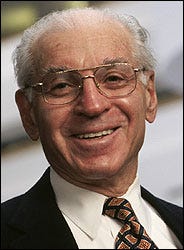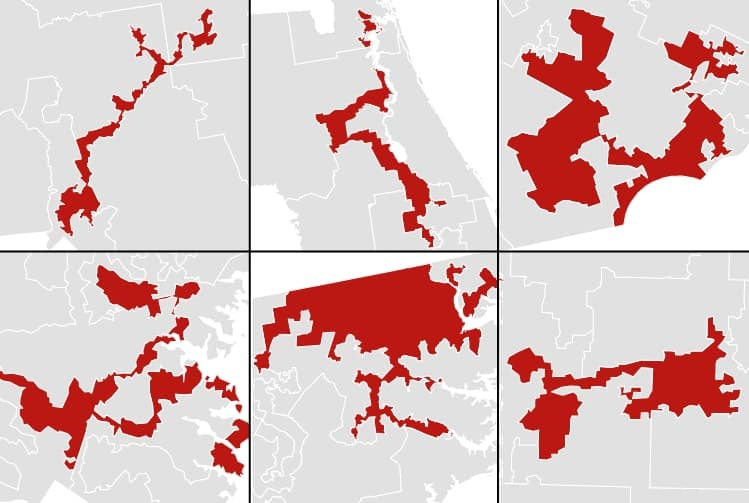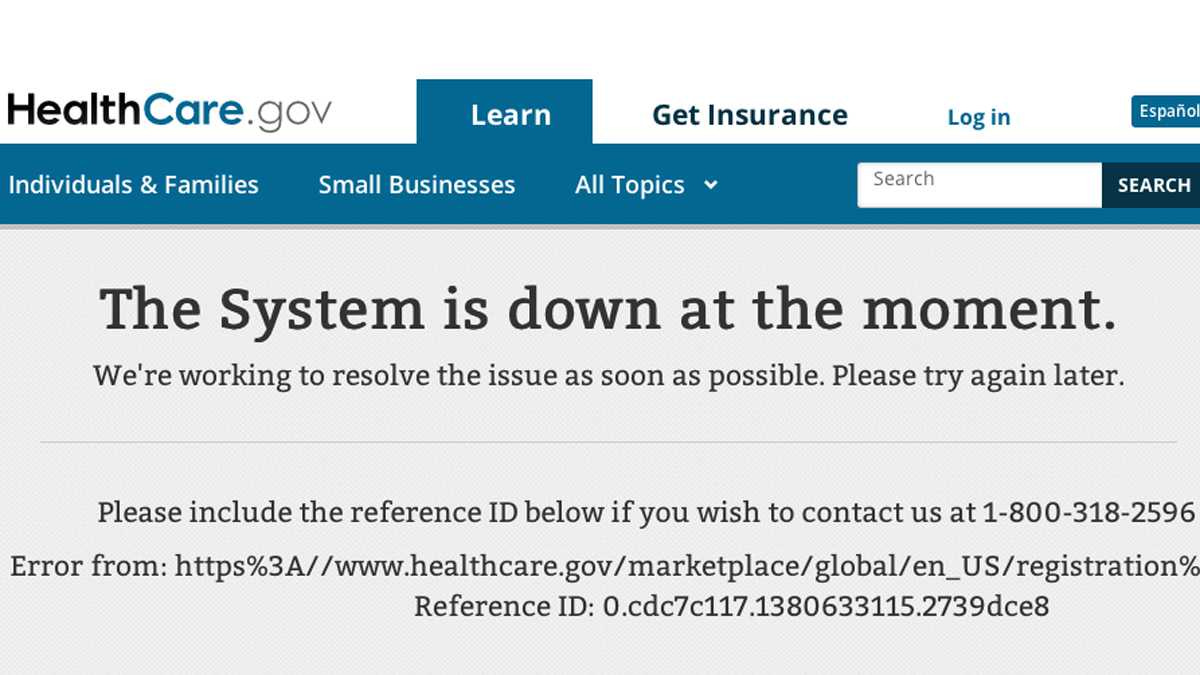Ruminating with JOSH WESTON
A retired Fortune 500 CEO on fixing the tax system, the "five-side solution" to gerrymandering, and repairing the “integrity deficit” produced by widespread greed.
I met Josh Weston in the late 20th Century when he was just stepping down as chairman and CEO of Automatic Data Processing (ADP), which he and the late Senator Frank Lautenberg had built into a Fortune 500 payroll company. Josh, now 92 and amazingly vital, is a major philanthropist and has served on a staggering array of non-profit and government advisory boards involving education, science, the performing arts, veterans, the environment, technology, public television and Israel. On many of these boards, his large donations, challenge grants and innovative recommendations have literally kept the organization alive. He and his late wife Judy were also extremely generous in the town both of our families call home—Montclair, New Jersey. Judy was known in town for approaching people in need with a $20 bill and saying, “I think you dropped something.” Josh may be best known as a steady and often acerbic idea machine, constantly originating or passing along intriguing thoughts on how to make things better. He’s a citizen in the best, old-fashioned sense of the word and an original thinker.
JON:
Hi, Josh. How has the sense of responsibility in corporate America changed in your lifetime?
JOSH WESTON:
Greed has expanded. When I was CEO, I told our board compensation committee that no CEO should get more than seven times the average full-time salary. It's now around 300 times for some [CEOs]. And now you see guys making hundreds of times the average pay when the company is losing money. And recently, a guy running a payroll business was awarded an annual compensation package worth $211 million!
When a lot of people do the same thing, they don't say “it’s greed” anymore. They say “everybody's doing it.”
Before the pandemic, I often spoke to MBAs. I’d say, “I want to talk about America's biggest deficit. Raise your hand if you want to tell me America's biggest deficit.” Some would say the federal deficit, the debt limit, whatever. I’d say, “You got it all wrong. The biggest deficit in America is the integrity deficit.” And then I’d launch into talking about integrity. The key cause of deteriorating integrity can be related to an archers bull's eye. The white in the middle is any behavior that is absolutely pure. The black is any behavior that's absolutely wrong, like killing somebody. The gray is where people figure, “Well, I'll monkey with my income tax and at worst, they'll charge me back interest.” I think in general, people in the 1960s put a higher value on integrity than they do now.
“When a lot of people do the same thing, they don't say “it’s greed” anymore. They say “everybody's doing it.””
JON:
You’ve got a million good ideas that should be adopted. Let’s start with the one about gerrymandering.
JOSH WESTON:
If someone brought another suit on terrible gerrymandering, instead of ducking it, the Supreme Court should come up with rules. It should say any district must have no more than five sides to it.
JON:
The “five-side solution.” I love it!
JOSH WESTON:
So that would mean that it couldn't be shaped like a salamander. Or a spider with 20 legs. This would outlaw that and come a little closer to common sense even if it didn’t entirely fix the problem.
JON:
It’s not surprising that the cynical Republicans—once the party of fiscal discipline—want the infrastructure goodies but refuse to put forward any real plan to pay for it. And it’s not just tax hikes they reject. Biden wants to radically increase the IRS audit budget and they’re even against that.
JOSH WESTON:
In the early Nineties, I was on a [Clinton-appointed] presidential commission to review the IRS. Newt Gingrich came—as Speaker of the House—and said, “Every year from now on we gonna keep cutting the IRS budget.”
JON:
I remember sitting in a hearing room in the Capitol listening to crazy Republicans—yes, we had a lot of them, then, too—comparing IRS agents to jack-booted thugs—Nazis. And it worked.
JOSH WESTON:
So the audit rate now is one percent. When you tell people the audit rate is less than one percent, they don't think about right versus wrong; they think about risk versus reward. They figure, the IRS might audit me and then I’d have to pay a penalty. But that’s tax avoidance, not tax evasion, so I won’t be in real legal trouble. And they’d charge me interest. But so what? In the meantime, I can save thousands or millions with little chance of getting caught. The current IRS commissioner said recently that they're missing a trillion dollars a year in revenue. A trillion dollars. Did you see that one?
JON:
I like that figure. It reminds me of all the money the Treasury can reap just by raising taxes on the super-rich. It used to be you had to raise taxes on the middle class to bring in a lot of new revenue. Not any more.
Biden’s three revenue raisers—better IRS enforcement, higher top brackets and an alternative minimum tax—all make sense and bring no pain to the vast majority of Americans.
JOSH WESTON:
Biden’s alternative minimum tax doesn't get around the tax evasion of using Ireland and Liechtenstein.
There’s a very easy alternative, which you can use with any publicly-owned company, or any company that's borrowing money from a bank. You simply say that the alternative minimum tax is 15 percent [or whatever rate is agreed upon] of whatever you told your shareholders your earnings were. It’s a pretty good bet they’re not going to reduce the earnings they report to their shareholders—and it would be stupid to reduce earnings when borrowing money. So the government will get a very accurate basis for the alternative tax from financial statements. In such a plan the company should be allowed to subtract any income tax paid to another country.
JON:
Like most good ideas, that’s pretty simple.
JOSH WESTON:
But you need one more thing. Right now, any corporation borrowing a lot of money or selling stock or executing some other significant change has to file a form with the SEC describing it. It just has to be signed by the CEO and the CFO, period. But they can just say they were misinformed by their own people. I’ve been arguing for ten years that this document should also have to be signed by the General Counsel, who would have to state [under possible criminal penalty] that he or she is unaware of any errors of commission or omission in this filing. That would dramatically increase the accuracy of the filings.
JON:
Another good one.
JOSH WESTON:
I belong to a group called Business Executives for National Security. In 1999, I was chair of a BENS’ commission called the “Tooth-to-Tail Commission,” aimed at a problem that costs the government hundreds of billions of dollars. “Tooth” is military lingo for fighting forces. “Tail” is overhead. Historically, the tail used to be about 30 percent of the Pentagon budget, but it grew to 50 and eventually 60 percent of what we spend on the military. BENS came up with 14 proposals to fix this.
The new secretary of defense, Donald Rumsfeld, endorsed our plan and was beginning to act on it.
JON:
Yeah, his NY Times obit last week said that before 9/11 he was planning to sharply reduce Pentagon spending. History’s weird that way.
Your mega-reform idea is “Pilot Before You Pile-It,” by which you mean try an idea in a small pilot program before you apply it to a whole agency much less the whole government. Example?
JOSH WESTON:
I’d ask the President to ask his Secretary of Defense to pick just one element—let’s assume it's a $10 billion program—and get Congress to authorize the President to change any rules and job protections in that $10 billion unit without having to go to Congress. Then tell the secretary defense, “You got one year to shake out all the crap.” And since it's only one unit, it wouldn’t be shocking to discover they save 25 percent. Now you have a message and then you say “Let's go to another unit that spends $100 billion.”
Remember when the Affordable Care Act website crashed when it launched?
JON:
That was really embarrassing to Obama. I wrote a long piece about it.
JOSH WESTON:
Well, imagine if they had piloted it in 2013 in, say, Rhode Island and South Dakota before rolling it out nationally. They would have gotten all the bugs out.
JON:
But if they’re going to hold Congress the Democrats have to show that government works. So if you slow it down with too much piloting, people are going to go, “Whoa, wait a minute, they passed this big thing and I didn’t see that much change.” I guess there are some places where we just can't do it.
JOSH WESTON:
It can be done in most agencies of the federal government.
JON:
On a policy matter: You’ve been heavily involved in educational philanthropy. As you know, one of my obsessions is the pathetic six-year graduation rates from community colleges—under 20 percent in many places. So we’re burdening these [former] students with debt and they aren’t even getting the degree or vocational certificate. Much of the problem is financial or personal, but a lot of it is that the guidance/advisory programs at these public colleges just suck. Ratios of one counselor to 1,000 students—or worse. By the time the community college notices someone has dropped out, they’ve been gone for six months. There’s no early warning system like in private colleges, where unions don’t usually prevent faculty from taking on advisory functions.
I hope some of this Biden money goes for advisors.
“A different version would be to have an optional fifth year in high school for vocational training. Everybody doesn't belong in college, right? But if they come out with a plumber skill, it can be a good living.”
JOSH WESTON:
A different version would be to have an optional fifth year in high school for vocational training. Everybody doesn't belong in college, right? But if they come out with a plumber skill, it can be a good living. Geez, every time the plumber comes here, he gets $250 for 15 minutes of work.
JON:
Finally, Josh, do you think that your children and grandchildren will have to deal with a war with China?
JOSH WESTON:
It would be very stupid to have a nuclear war, and unlikely. But I think China is heading for some kind of confrontation with us the way their country is growing. They’ll have a bigger GDP than us in a few years (by 2030). And they are focused, whether you like what they're focused on or not. We're like vegetable soup all over the place with carrots and green peas and God knows what.
JON:
I knew I could count on you to give it to me straight. Thanks, Josh.









Thanks Josh and Jon for upholding the notion that govt is, at bottom, a beneficial institution focused on the GENERAL good and not the welfare of corporations and politicians. The simple solutions outlined here remind me of the elegant ideas of the late physicist Richard Feynman.